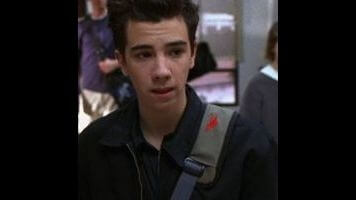Undeclared: “Jobs, Jobs, Jobs”

Up to this point, Undeclared has painted a rosy picture of the collegiate experience. We’ve only seen the kids in class once, and even then, it was a class presided over by Fred Willard, so it was a fun detour into actual academia. Nonetheless, the world Undeclared exists in during its first three episodes is perpetually cast in the magic-hour glow of the memories that make college the topic of fond reminiscing among post-grads: Hanging out in the dorms. Outdoor movie screenings. Casual sex. Drinking. Making new friends. Getting pecked within an inch of your life by an irritated cockatoo. More drinking. Trying to turn casual sex into lasting relationships. It’s exactly as the first few weeks of college should be remembered—like a summer camp for kids in their late teens having their first real brushes with independence.
But then after that? Well, to paraphrase a cliché piece of advice from Hal in “Jobs, Jobs, Jobs”: “Welcome to the real world.”
Unfortunately, at this point, Undeclared doesn’t do “the real world” very well. Neither does its protagonist. When Steven finds out his college fund is essentially paying for his parents’ divorce (and his mother’s subsequent excursion in “swinging Prague”), he’s forced to take a job in a university cafeteria—a job he’d previously and brusquely turned down when it was offered to him by Marshall. And, from there, we get the most egregious example of “Whining Steven” we’ll see throughout the series. It’s not an attitude that suits Jay Baruchel (see also: this year’s dismal She’s Out Of My League), which makes it really difficult to sympathize with Steven’s be-aproned plight—even when he’s bearing the brunt of verbal abuse from screaming Apatow bit player Gerry Bednob. A lot of the episode’s humor relies on Steven’s humiliation in the caf, and when it works—Bednob berating him for trying to smuggle a half-eaten pie out of the kitchen—it works, but when it doesn’t—almost everywhere else—it makes me long for a time before campus dining was introduced to the show’s palette.
Steven’s petulance gets harder to take after he finds out he’s not the only Karp working in food service—Hal, knocked down from his mighty sales throne, is now waiting tables at a fancy restaurant, which he reveals to Steven at said restaurant. At this point, however, the other principals step in to stem the whining. Lizzie forces Steven to realize that he’s being a jerk, and a giant wad of cash convinces him that there’s no shame in being the son of a waiter. Humbled, he returns to the cafeteria job he’d previously quit—a facile conclusion to a storyline that thankfully won’t be revisited.
For some reason, that glibness is really bothering me after this, my fourth or fifth viewing of “Jobs, Jobs, Jobs.” It’s not like Undeclared to treat a plot point so superficially, and it really seems like the writing staff is out of its element dealing with the cafeteria stuff. I wouldn’t accuse the show’s perspective for being this narrow, but Steven’s misadventures in food service could serve as proof that Undeclared’s view of college is as entitled as Steven’s is at the beginning of “Jobs, Jobs, Jobs.”
Of course, I might also be annoyed with the cafeteria scenes because they take us away from peering into Rachel’s brief fling with a wannabe sketch comedian, played by Geoffrey Arend (of subsequent “the snozzberries taste like snozzberries” and “being married to Christina Hendricks” fame). As Lloyd’s theater-department colleague, Jimmy, Arend trots out an impressive array of impressions—Christopher Walken, Jimmy Stewart, Scooby-Doo, et al.—that drive an impenetrable wedge between him and Rachel. The slowly building frustrations of their interactions are funny, but funnier still is the way director Greg Mottola channels the oppressive influence of Jimmy’s heroes through the decorations in the kid’s room. It’s a touch heavy-handed, but seeing Jim Carrey leer at Rachel from the Ace Ventura: Pet Detective poster—and, more appropriately, sit over Jimmy’s shoulder in the guise of The Cable Guy—adds a playfulness to the show’s static visual style. It also humanizes Jimmy, providing an oversized illustration of his ambitions, reducing the impression that he’s just some freak with a bunch of silly voices. Taking your comedy icons too seriously—now that’s something that’s more squarely in Undeclared’s wheelhouse.
Stray observations
- “Rice pudding? That’s pudding, with rice in it?”
- “I saw this in a film—you are a student by day, and an illustrious man-prostitute by night”
- Perry’s freestyle corner: “Steven, believin’ / The story that I’m weavin’ / Without the skills to pay the bills / Even Steven, he be thievin’”
- “I can’t sell my customers cake that has been in a boy’s knapsack!”
- “Hi-ho, Kermit The Frog here and today’s letter is ‘S,’ for shallow.”